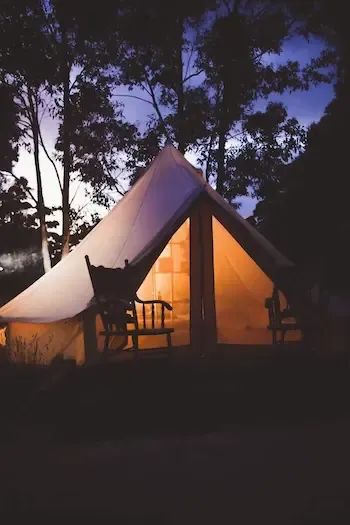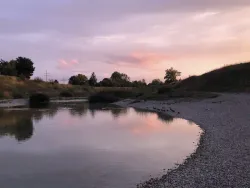Ultimate Camping Packing List - Travel Essentials

Why Preparation is Key for Camping
Camping is a remarkable way to connect with nature, create lasting memories, and escape the hustle and bustle of daily life. However, a successful camping trip hinges on one critical factor: your level of preparation.
Imagine this: You’re in the middle of a pristine forest, surrounded by the soothing sounds of nature. But suddenly, you realize you’ve left behind essential camping gear. Panic sets in, and your tranquil getaway becomes a stressful survival scenario. This is why being well-prepared for camping is non-negotiable.
In this comprehensive guide, we’re unveiling the secrets to camping triumph. Explore the must-have gear, insider tips, and wisdom from seasoned campers who’ve conquered diverse terrains across the globe.
From the rugged wilderness of the Rocky Mountains to the serene shores of the Great Lakes, we’re here to ensure you’re equipped with the knowledge and equipment to embrace any camping destination with confidence. Whether you’re planning a weekend escape or an extended backcountry adventure, it’s time to discover what to pack for camping and make your outdoor experience unforgettable.
Pro tip
Use waterproof stuff sacks to keep your clothing, sleeping bag, and other essentials dry and organized inside your backpack. This helps protect your gear from unexpected rain or splashes.
Camping Packing Checklist
Clothing for Camping
What you wear while camping can greatly impact your comfort and safety. Be mindful of the season, climate, and activities you have planned. Here’s a basic list of clothing items to consider packing for your camping trip:
- Base Layer (moisture-wicking)
- Insulating Layer (fleece or down jacket)
- Waterproof Jacket or Rain Poncho
- Quick-drying Pants
- Sturdy Hiking Boots or Camp Shoes
- Warm Hat and Gloves
- Extra Socks and Underwear
- Swimsuit (if swimming is a possibility)
- Pajamas or Sleepwear
Remember to check the weather forecast for your camping location and plan accordingly. Layering your clothing allows you to adapt to changing temperatures, ensuring a comfortable experience. Safety and comfort should always be your top priorities when selecting camping attire.

Camping Packing List
Camping is a thrilling outdoor adventure, and being well-prepared with the right gear and accessories can make all the difference in ensuring a memorable and comfortable experience in the great outdoors.
Clothes
- Hiking Boots
Buy
- Hiking Socks
- Hiking Jacket
Buy
- Hiking Pants
Buy
- Fitness Shirt
- Jeans
- Scarf
- Beanie
- Gloves
- Heavy Coat
Buy
- Thermal underwear
Buy
- Hat
- Shirts
- Pants
- Belt
- Sleepwear
- Pajamas
- Bras
- Underwear
- Shoes
Hygiene
- Sunscreen
Buy
- Tampons
Buy
- Makeup remover
Buy
- Makeup
- Shaving cream
- Razor
- Comb
- Towel
- Deodorant
Buy
- Shampoo
- Soap
- Toothpaste
- Toothbrush
Buy
Accessories
- Knife
Buy
- Passport Holder
- Travel Insurance
- First Aid Kit
Buy
- Travel Journal
- Reusable Shopping Bag
Buy
- Backpack
- Camera
- Travel Adapter
- Powerbank
Buy
- Water Bottle
Buy
- Headphones
Buy
- Insect Repellent
- Headlamp
- Portable Lantern
- Camping Stove
- Sleeping Bag
Buy
- Tent
Documents
- Travel insurance documents
- International driver license
- Driver license
- Passport
Entertainment
- Speakers
Buy
- Binoculars
Buy
- Tablet
- E-reader
Buy
- Puzzle
- Board games
- Playing cards
Buy
- Book
Items to Avoid Bringing Camping
While preparing for camping, it’s essential to know which items are better left behind to ensure a hassle-free and enjoyable experience amidst nature. Here’s a list of items to avoid:
- Excessive Electronics: Disconnect from the digital world and embrace the natural surroundings. Leave unnecessary electronics at home.
- Valuable Jewelry: Camping can be rugged, and valuable jewelry can be lost or damaged easily.
- Noisy Gadgets: Loud electronic devices can disrupt the tranquility of the wilderness and disturb other campers.
- Impractical Gear: Avoid carrying overly heavy or bulky items that will weigh you down and make hiking and setting up camp more difficult.
- Unnecessary Luxury Items: While camping can be comfortable, don’t overpack with unnecessary luxuries that detract from the outdoor experience.
- Disposable Items: Opt for reusable items like water bottles and cutlery to reduce waste and minimize your impact on the environment.
- Heavy Makeup: Keep your beauty routine simple while camping. Heavy makeup is impractical and can be uncomfortable outdoors.
- Formal Clothing: Leave your formal attire behind; casual, comfortable clothing is best for camping.
- Strong Perfumes: Fragrances can attract unwanted insects, so it’s best to go fragrance-free or use insect-repellent scents.
Packing Tips for Camping
When it comes to packing for a camping trip, strategic packing can make all the difference in ensuring a comfortable and enjoyable outdoor experience. Here are some tips to help you organize and optimize space in your camping gear:
-
Prioritize Essentials: Start by creating a list of essential items you’ll need for your camping adventure. Focus on the basics like shelter, food, water, and safety gear. Leave behind items that aren’t necessary for your trip.
-
Use Packing Organizers: Consider using packing organizers like stuff sacks and dry bags to compartmentalize your gear. These organizers can help you keep items dry and easily accessible.
-
Layer Your Gear: Place larger and heavier items, such as your tent and cooking equipment, at the bottom of your backpack or gear storage. Lighter and frequently needed items should go on top for quick access.
-
Choose Versatile Gear: Opt for camping gear that serves multiple purposes. For instance, a multi-tool can be invaluable for various tasks, and a portable solar charger can provide power and light.
-
Streamline Your Kitchen: Use compact cookware and utensils to save space in your camping kitchen. Consider using dehydrated or freeze-dried foods to minimize the weight of your food supplies.
-
Pack Efficiently: Store your camping food in airtight containers or resealable bags to prevent spills and odors. Label your containers to make meal preparation easier.
-
Weather-Appropriate Clothing: Pack clothing that’s suitable for the expected weather conditions. Layering is key for regulating your body temperature. Don’t forget to pack rain gear and extra layers for colder nights.
How to Choose the Right Campsite
Selecting the ideal campsite is essential for a successful camping trip. Here are some factors to consider when choosing a campsite:
-
Location: Ensure your campsite is in compliance with local regulations and camping guidelines. Choose a location that is safe and suitable for your camping activities.
-
Proximity to Water: Campsites near a water source are convenient for drinking, cooking, and cleaning. However, camp at least 200 feet away from lakes and streams to protect water quality and wildlife.
-
Terrain: Look for a flat and level area to set up your tent. Avoid low-lying areas that may flood during rain, and steer clear of steep slopes.
-
Sun and Shade: Consider the sun’s path throughout the day. A mix of sun and shade can provide comfort and protection from the elements.
-
Access to Trails: If you plan to explore hiking trails, choose a campsite with easy access to the trails you want to explore.
-
Wildlife Concerns: Be mindful of wildlife activity in the area. Avoid camping near animal habitats and follow food storage guidelines to prevent encounters with bears and other wildlife.
-
Leave No Trace: Follow Leave No Trace principles at your campsite to minimize your environmental impact. Leave the campsite as you found it for future campers to enjoy.
By carefully selecting your campsite and adhering to camping ethics, you can ensure a safe and enjoyable camping experience in the great outdoors.
Resources
These resources will help you plan and enjoy camping trips with ease
- Recreation.gov - One of the most popular and user-friendly platforms for booking camping sites, primarily offering paid campsites.
- Reserve America - Allows you to search for camping sites by zip code, making it convenient to find available campsites in specific areas.
- FreeCampsites.net - Your go-to resource for finding free and budget-friendly camping areas with a map-based search engine and community reviews.
- Hipcamp.com - Operates like the Airbnb of camping, offering unique campsites and alternative camping options.
- TheOutbound.com/Discover - A platform to discover exciting activities while camping, with a primary focus on outdoor adventure ideas.



